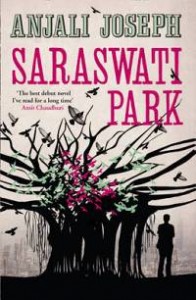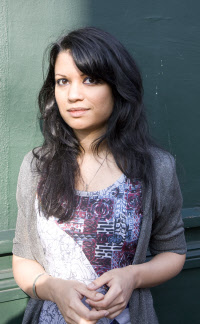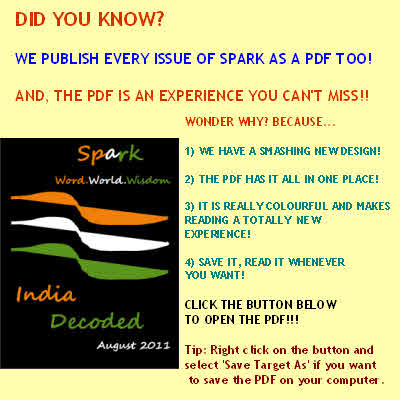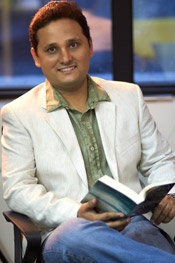Interview by Anupama Krishnakumar
[box]In an interview to Anupama Krishnakumar, Anjali Joseph shares her thoughts on writing, her first book, the experience of writing it and of course, awards. Don’t miss this short and sweet interview![/box] [box type = “bio”]Anjali Joseph was born in Bombay in 1978. She studied English at Trinity College, Cambridge, and has taught English at the Sorbonne. More recently she has written for the Times of India in Bombay and been a Commissioning Editor for ELLE (India). She studied Creative Writing at the University of East Anglia. ‘Saraswati Park’, published by Harper Collins in 2010 is her first novel. In 2011, Anjali won the Betty Trask Award and the Desmond Elliott Prize for her debut novel. Further, ‘Saraswati Park’ has been shortlisted for the Vodafone-Crossword Award for 2011 under the Fiction category.[/box]You have started your career as a writer with a work of fiction. What is it about writing fiction that you truly enjoy?
Writing fiction is a way of reordering my experiences, some actual, some imagined, and that has always made sense to me.
Writers tend to be inspired by other authors. Who are the ones who inspire you?
There are probably too many to list. Samuel Beckett, Gustave Flaubert, James Joyce, R K Narayan, Marcel Proust, Françoise Sagan, the detective novels of Margery Allingham, Hergé’s Tintin books, and among contemporary Indian writers, particularly Upamanyu Chatterjee and Amit Chaudhuri.
Your first novel ‘Saraswati Park’ is set in Bombay. What does the city mean to you?
Home. And beyond that, a delightful and infuriating place.
How much of your experiences (in terms of what you have witnessed/heard) has contributed to the plot of the book and the characters?
The places and emotions are most true to life, but the characters and incidents are invented. I did go and spend a couple of days sitting with the letter writers near the GPO; I used to commute to work on the train, and I’ve worked in and walked about Bombay, so many of the locations are drawn from places that caught my imagination.
It’s interesting that you have chosen to bring in the character of a letter writer – that’s something really different. How did you actually go about developing this character? Did you interact with such people during the course of writing this book?
I did (above). The letter writers are not exactly like my protagonist – he’s an anomaly, economically at least. But they are people who are curious about life, of a contemplative bent, good at studying people, and most of them read a good deal and speak several languages. Meeting the real letter writers came late on in the book though; I had this person in my head before, and he and his obsession with second hand books were clearly there from the start.
Writing a good book no doubt involves plenty of hard work, sincerity and passion. How long did it take for you to write ‘Saraswati Park’? And the writing journey itself – how was the experience?
‘Saraswati Park’? And the writing journey itself – how was the experience?
It took a year and a half. I think being dogged was the most significant thing. I enjoyed the writing, and even the rewriting. It felt both private and sometimes alarmingly audacious.
How would you define your writing style? In other words, what’s the sort of audience you have in mind when you write your books?
I try not to think about it. My ideal reader is someone a bit like my seventeen-year-old self, someone who reads a lot and prefers discovering things in a second-hand book shop or stall than being told what to read.
You have recently won the Betty Trask Award as well as the Desmond Elliott Prize for your debut novel. How does it feel? What do awards mean to you?
The book had been out for almost a year by then, and both happened in a week, so it was strange as well as wonderful. Awards like this make it possible to continue writing full time, and most of all, it is very heartening that people I didn’t know at all read the book and warmed to it.
I am also interested in knowing your thoughts on writing non-fiction. Do you enjoy it? Are you planning to bring out a work of non-fiction anytime?
I write some journalism and book reviews, but not much else in the way of non-fiction. I’ve enjoyed writing the odd essay or critical piece, though non-fiction can make me feel furtive: it sometimes feels too openly assertive or as though it’s trying to be more authoritative than I feel comfortable with.
Your journey as an author has begun with a book that has won accolades. What’s the next one coming from Anjali Joseph?
I’ve been working on a novel about some people in their twenties. The central character, a woman, moves between Paris, London, and Bombay; it’s about discovering some sense of self in early adulthood amid all the encounters that take place.
CLICK HERE TO GO BACK TO THE MAIN FEATURE
[facebook]Share[/facebook] [retweet]Tweet[/retweet]
[button link=”https://sparkthemagazine.com/wp-content/uploads/2011/08/Spark-August-2011.pdf” newwindow=”yes”] Click here to download the August 2011 issue as a PDF[/button] [button link=”http://issuu.com/sparkeditor/docs/spark-august-2011?mode=embed&layout=http%3A%2F%2Fskin.issuu.com%2Fv%2Fcolor%2Flayout.xml&backgroundColor=000000&showFlipBtn=true” color=”green” newwindow=”yes”] Click here to read the August 2011 issue like a magazine[/button]








[…] Anjali Joseph through ‘Discovering Saraswati Park’ […]